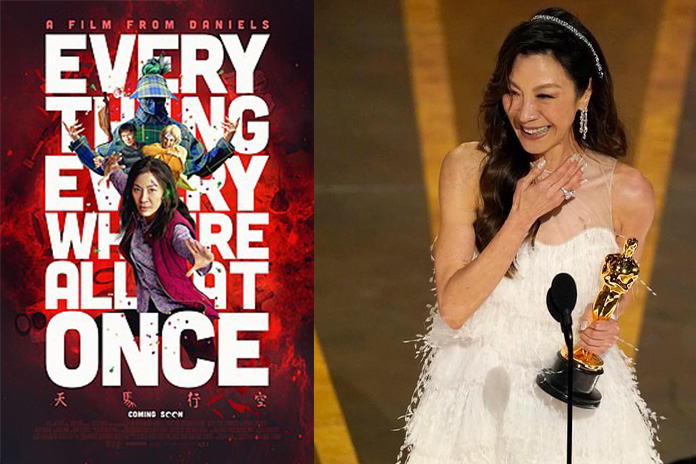
THE universes in the multiverse aligned and things happened: Everything Everywhere All At Once.
Asia dominated proceedings in Hollywood during the 95th Oscars, which, in stark contrast to last year’s slap-fest involving Will Smith and Chris Rock, has emerged as an extremely inclusive awards ceremony.
Everything Everywhere All At Once (EEAAO) picked up 7 of the 11 Academy Awards it was nominated for, sweeping the major awards.
EEAAO breaks viewers into three camps: One group loves it; another hates it; and the third has no idea what it’s about. Is it sci-fi or nonsense? B-grade camp, or clever beyond belief? Whether it’s the story line, the concept, the setting, the ordinariness of the characters, or the actors, all at once, it’s become all things to everyone. Well, you’ll certainly have an opinion about it.
EEAAO Wins Big
Michelle Yeoh won for Actress in a Leading Role, making her the first Asian woman to do so in the history of the Oscars, since its inception in 1929. Her win, at the age of 60, gave a boost and renewed purpose to the silver generation to remain relevant in a changing, and often ageist, world.
Along with Yeoh, the EEAAO bandwagon with its quirky, off-beat sci-fi narrative about the multiverse populated with goofy characters, won for best Film, Supporting Actor, Supporting Actress, Screenplay, Directing and Editing.
Ke Huy Quan, who bagged the Supporting Actor Oscar, celebrated his return to acting in a big way. The Vietnam-born actor played Short Round in Indiana Jones And The Temple Of Doom and a few other appearances before quitting the scene due to the lack of Asian roles. But the desire to act never died. His parting on a successful comeback: “To all of you out there, please keep your dreams alive.”
The Daniels — Daniel Kwan and Daniel Scheinert — who directed EEAAO must be revelling in the moment. I doubt they expected to pick up anything at the start of their journey.

But maybe there is hope for offbeat films in this new inclusive era.
India’s Victory Dance
India featured among the winners as well. The blockbuster Telugu hit RRR bagged the best song award. The drum-dominated Naatu Naatu with its foot-stomping choreography saw composer M.M.Keeravaani and lyricist Chandrabose on stage, ahead of the chasing pack that included Rihanna and Lady Gaga.
The Elephant Whisperers was another first-time win for India, and director Kartiki Gonsalves. The 40-minute Tamil-language film won in the Documentary Short Film category.
Even the weighty challenges of the obese found a place onstage, with Brendan Fraser finally winning the Best Actor award for The Whale.
It may seem like an unlikely cast of winning characters that the 10,000 voting members of the Academy Awards chose. It’s a motley crew that spiced up the proceedings.
But it could be just setting the stage for next year’s Oscars, when new inclusion conditions have to be met before films can qualify for nomination. These include balancing between having women, racial/ethnic groups, LGBTQ+ and people with disabilities in movies that wish to be considered for an award. You can read about the requirements here.
With so many conditions to meet, I wonder, when all these politically correct navigating is incorporated into the process, will the process or the art be the winner?





















